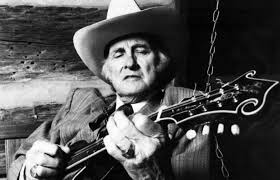BILL MONROE (AND THE BLUE GRASS BOYS)
- From Rosine, Kentucky.
- Born September 13, 1911. Died September 9, 1996.
- Full name: William Smith Monroe.
- He is known as the Father of Bluegrass Music.
- Mentors: “Uncle Pen” (Pendleton) Vandiver, a fiddler; and Arnold Schultz, a African-American guitarist and fiddler whom Monroe credits with inspiring the blues in bluegrass.
- Began playing music when he was eight years old. His brothers and sisters played fiddles and guitars, and Bill wanted to do the same. But since he was the youngest, he was given the mandolin.Lived with his Uncle Pen Vandiver (his mother’s brother) after his parents died (they both died before Bill was 17). He learned fiddle music from him.
- 1929, at age 18, began performing with his brothers Birch and Charlie in east Chicago, while working at the Sinclair refinery (during the Great Depression.)
- 1934, formed “The Monroe Brothers,” a duo with his brother Charlie. Signed by on RCA Victor’s “Bluebird” label and made first record on February 17, 1936.
- 1938, moved to Little Rock, Arkansas and formed “The Kentuckians.” Later moved to Atlanta and formed “The Blue Grass Boys,” named after the nickname of his home state.
- 1939, auditioned for the Grand Ole Opry and was hired on the spot.
- First song sung on the Grand Ole Opry: “The Muleskinner Blues.”
- 1940’s, traveled with a professional baseball team that played local semi-pro teams in exhibition games preceding the concert.
- Experimented with various musicians during the early 40’s, including an accordian player and a clawhammer style banjo played by David “Stringbean” Akeman.
- 1945, Lester Flatt and Earl Scruggs joined Monroe’s band and bluegrass music as we know it today was born. Other members of the original “bluegrass” band: Chubby Wise on fiddle, and Howard Watts on bass.
- The only bluegrass artist to have remained with a major record label throughout his career. He began on RCA, but switched to Columbia Records in 1945 because he didn’t want to be on the same label with his brother, Charlie. In 1950, he switched again to Decca (now MCA) because he didn’t want to be on the same label with Flatt and Scruggs who left his band to form their own. While he did not record new material during the latter part of his life, MCA claims that he was still with their label until his death in 1996.
- 1951, purchased the Brown County Jamboree in Bean Blossom, Indiana and hosted bluegrass festivals there beginning in 1967.
- 1966, was made an honorary Kentucky Colonel.
- 1970, was elected to the Country Music Hall of Fame.
- 1981, survived a bout with cancer.
- 1986, U.S. Senate passed a resolution recognizing and honoring Monroe’s contribution to American music.
- 1989, was awarded the first Grammy Award in the newly-created Bluegrass category (for his album Southern Flavor
).
- 1991, had double heart bypass surgery.
- 1991, inducted into the Bluegrass Music Hall of Fame (then known as the Hall of Honor.) Monroe is considered the Hall’s first inductee although Lester Flatt and Earl Scruggs were inducted that same year.
- 1993, received a Lifetime Achievement Award from NARAS (National Association of Recording Arts and Sciences) at the Grammy Awards—the highest honor that can be presented to a recording artist.
- 1995, awarded the National Medal of the Arts by President Clinton at the White House.
- 1996, died of complications from a stroke (September 9) just 3 days short of his 85th birthday.
- 1997, was inducted into the Rock and Roll Hall of Fame in Cleveland, Ohio.
- Last recording of an original song: “The Days Gone By” (on his 1988 Southern Flavor
album). - Last recording session: Feb. 21, 1996, sang harmony on an album by Billy and Terry Smith: Bill Monroe Tribute
(K-Tel Records).
- Last live performance: The Friday night Opry, March 15, 1996. He sang “True Life Blues.”
RECOMMENDED ALBUMS:
- Music of Bill Monroe From 1936-1994
(MCA) This is a 4-CD set featuring highlights from Monroe’s entire career. A wonderful overview of his musical legacy.
- The Very Best Of Bill Monroe And His Blue Grass Boys
(MCA Nashville) A nice sampling of Monroe’s hits (22 cuts on one CD).
- Anthology (MCA Nashville) A 2-CD set with another good selection of Monroe classics.

